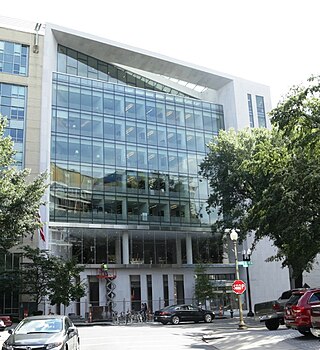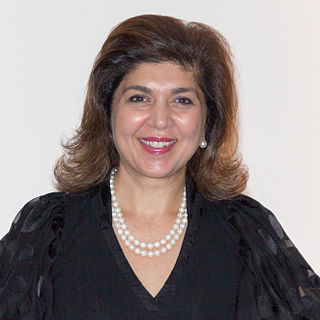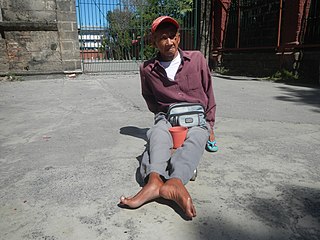Homeland security is an American national security term for "the national effort to ensure a homeland that is safe, secure, and resilient against terrorism and other hazards where American interests, aspirations, and ways of life can thrive" to the "national effort to prevent terrorist attacks within the United States, reduce the vulnerability of the U.S. to terrorism, and minimize the damage from attacks that do occur." According to an official work published by the Congressional Research Service in 2013, the "Homeland security" term's definition has varied over time.
The International Accounting Standards Committee (IASC) was founded in June 1973 in London at the initiative of Sir Henry Benson, former president of the Institute of Chartered Accountants in England and Wales. The IASC was created by national accountancy bodies from a number of countries with a view to harmonizing the international diversity of company reporting practices. Between its founding in 1973 and its dissolution in 2001, it developed a set of International Accounting Standards (IAS) that gradually acquired a degree of acceptance in countries around the world. Although the IASC came to include some organizations representing preparers and users of financial statements, it largely remained an initiative of the accountancy profession. On 1 April 2001, it was replaced by the International Accounting Standards Board (IASB), an independent standard-setting body. The IASB adopted the extant corpus of IAS which it continued to develop as International Financial Reporting Standards.

The U.S. Government Accountability Office (GAO) is a legislative branch government agency that provides auditing, evaluative, and investigative services for the United States Congress. It is the supreme audit institution of the federal government of the United States. It identifies its core "mission values" as: accountability, integrity, and reliability. It is also known as the "congressional watchdog".

The Jewish Institute for National Security of America (JINSA), formerly named the Jewish Institute for National Security Affairs, is a Washington, D.C.-based, non-profit and pro-Israeli lobby and think tank. It was founded in 1976 focusing on issues of national security, advocating that Israel can play an important role in bolstering democracy. It claims it has a membership of 20,000.

National security, or national defence, is the security and defence of a sovereign state, including its citizens, economy, and institutions, which is regarded as a duty of government. Originally conceived as protection against military attack, national security is widely understood to include also non-military dimensions, including the security from terrorism, minimization of crime, economic security, energy security, environmental security, food security, and cyber-security. Similarly, national security risks include, in addition to the actions of other nation states, action by violent non-state actors, by narcotic cartels, and by multinational corporations, and also the effects of natural disasters.

Abdiqasim Salad Hassan or Abdiqasim Salad is a Somali politician. He helped found the Transitional National Government which he served as President of Somalia from 2000 to 2004, and previously served as Interior Minister and Finance Minister in the government of Mohamed Siad Barre.

The Center for Strategic and International Studies (CSIS) is an American think tank based in Washington, D.C. CSIS was founded as the Center for Strategic and International Studies of Georgetown University in 1962. The center conducts policy studies and strategic analyses of political, economic and security issues throughout the world, with a specific focus on issues concerning international relations, trade, technology, finance, energy and geostrategy.
Terrorism and mass attacks in Canada includes acts of terrorism, as well as mass shootings, vehicle-ramming attacks, mass stabbings, and other such acts committed in Canada that people may associate with terroristic tactics but have not been classified as terrorism by the Canadian legal system.

A humanitarian crisis is defined as a singular event or a series of events that are threatening in terms of health, safety or well-being of a community or large group of people. It may be an internal or external conflict and usually occurs throughout a large land area. Local, national and international responses are necessary in such events.
The International Arctic Science Committee (IASC) is a non-governmental organization which is composed of international science groups participating in arctic science research. IASC is an International Scientific Associate of ICSU, and was established in 1990. IASC's main aim is to initiate, develop, and coordinate leading edge scientific activity in the Arctic region, and on the role of the Arctic in the Earth system. It also provides objective and independent scientific advice to the Arctic Council and other organizations on issues of science affecting the management of the Arctic region. The decision-making organs of IASC are the Council and the Executive Committee. The day-to-day operations are supported by its secretariat headed by the executive secretary. IASC's geographical remit covers the Arctic Ocean and the surrounding landmasses.
The Australian Intelligence Community (AIC) and the National Intelligence Community (NIC) or National Security Community of the Australian Government are the collectives of statutory intelligence agencies, policy departments, and other government agencies concerned with protecting and advancing the national security and national interests of the Commonwealth of Australia. The intelligence and security agencies of the Australian Government have evolved since the Second World War and the Cold War and saw transformation and expansion during the Global War on Terrorism with military deployments in Afghanistan, Iraq and against ISIS in Syria. Key international and national security issues for the Australian Intelligence Community include terrorism and violent extremism, cybersecurity, transnational crime, the rise of China, and Pacific regional security.
The Institute for Defense Analyses (IDA) is an American non-profit corporation that administers three federally funded research and development centers (FFRDCs) – the Systems and Analyses Center (SAC), the Science and Technology Policy Institute (STPI), and the Center for Communications and Computing (C&C) – to assist the United States government in addressing national security issues, particularly those requiring scientific and technical expertise. It is headquartered in Alexandria, Virginia.

Anthony H. Cordesman holds the Arleigh A. Burke Chair in Strategy at the Center for Strategic and International Studies (CSIS) and is a national security analyst on a number of global conflicts.

Farah Pandith is an American academic of Indian descent. She was appointed the first-ever Special Representative to Muslim Communities in June 2009 by Secretary of State Hillary Rodham Clinton. The position was made specifically for her after she briefed Secretary Clinton about her work in the Bush Administration. She had the rare distinction of being a political appointee for two Republican presidents and President Obama. When she was the Special Representative she traveled to almost 100 countries. After serving under both Secretaries Clinton and John Kerry, she left government. She said she came to Washington after 9/11 again and wanted to serve – she left after more than a decade in public service. She worked at USAID and then went to the National Security Council and then the U.S. Department of State. When she left in 2014, she returned to her home state of Massachusetts.

Robert Orton Work is an American national security professional who served as the 32nd United States Deputy Secretary of Defense for both the Obama and Trump administrations from 2014 to 2017. Prior to that, Work was the United States Under Secretary of the Navy from 2009 to 2013, and before that served as a colonel in the United States Marine Corps; Work retired in 2001 and worked as a civilian at the Center for Strategic and Budgetary Assessments (CSBA) and the George Washington University in various positions relating to military and strategic study. From 2013 to 2014, he was the CEO of the Center for a New American Security (CNAS). After his time as Deputy Secretary of Defense, he went on to serve on the Board of Raytheon.

The Arctic policy of the United States is the foreign policy of the United States in regard to the Arctic region. In addition, the United States' domestic policy toward Alaska is part of its Arctic policy.

Douglas Farah is an American journalist, author and national security consultant. Farah served as United Press International bureau chief in El Salvador from 1985 to 1987, and a freelance journalist for The Washington Post, Newsweek, and other publications until being hired as a staff correspondent for The Washington Post in 1992. While working for the Post, Farah served as bureau chief of Central American and the Caribbean until 1997, international investigative reporter between 1998 and 2000, and of West Africa between 2000 and 2003. He left the Post in 2004, and has since authored two books and served as a contributor to peer reviewed publications such as the Journal of International Affairs and analysis pieces for Foreign Policy and the Center for Strategic and International Studies (CSIS).

Dezinformatsia: Active Measures in Soviet Strategy is a non-fiction book about disinformation and information warfare used by the KGB during the Soviet Union period, as part of their active measures tactics. The book was co-authored by Richard H. Shultz, professor of international politics at Tufts University, and Roy Godson, professor emeritus of government at Georgetown University.
The Ministry of Justice, Immigration and National Security of Dominica provides legal advice and representation to the federal government and its departments, as well as administers justice, protects intellectual property rights, and ensures that financial crimes are properly analyzed and investigated. The divisions of the ministry include the following:

Climate change has a disproportionate effect on individuals with disabilities, both directly and indirectly. Individuals with disabilities are more likely to experience greater effects of climate change on humans when compared to those without disabilities. Despite this, and despite the fact that disabled people make up more than 15% of the global population, they have had minimal input and involvement in the decision-making process surrounding responses to climate change. Typically, disabled people are the most likely to be negatively affected by any form of emergency, whether it be an immediate emergency like a flood or tornado or a gradual emergency like rising sea levels, due to a lack of access to emergency resources and the difficulties imposed by limited mobility. Disabled people are also more adversely affected by climate change because a disproportionate number of disabled people live in poverty, and people who live in poverty are inherently more at risk due to climate change.













